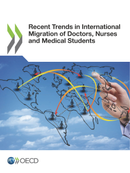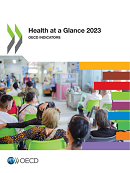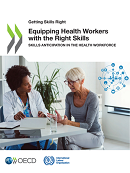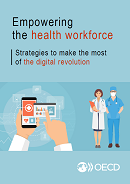Health policies and data
Health Workforce
|
The OECD advises countries on how to meet future demand for health professionals and how to manage the supply of health workers, by reviewing policies related to education and training, continuous professional development, geographic distribution and immigration.
The OECD also assesses changes in the scope of practice of healthcare providers, and the impact that these changes might have on access, quality and efficiency in health service delivery. |
 |
RECENT REPORTS on health workforce
| Health at a Glance 2023: OECD Indicators
Released 7 November 2023 The chapter on health workforce in Health at a Glance 2023 (chapter 8) reviews the most recent evidence on the supply and remuneration of doctors and nurses in OECD countries. This chapter also presents the latest trends in new graduates from medical and nursing education programmes, showing that the number of new graduates has increased in most countries. It also shows the latest trends in the number of foreign-trained doctors and nurses working in OECD countries, highlighting that both the number and share of foreign-trained doctors and nurses has increased over the past decade in several countries, indicating that the growth in domestic demand for doctors and nurses exceeded domestic supply. |
|
|
Equipping Health Workers with the Right Skills: Skills Anticipation in the Health Workforce Released 15 December 2022 The COVID-19 pandemic further exacerbated the long-standing skills shortages in the health workforce across countries. Equipping health workers with the right skills is essential to respond to future health crises, to prepare for increasing use of digital technologies, and to plan for demographic change. This joint report by the OECD and ILO aims to enable more resilient health workforces by helping countries to assess future demand in terms of both numbers of health workers and skills needs, and to prepare appropriate policy responses. The report provides a comparative overview of practices in 16 countries to anticipate future skill needs in the health workforce, and of how such information is used by policy makers and social partners to foster a better alignment with labour market needs. Analysis is based on interviews with institutions that are responsible for anticipating skill needs in the health workforce, a virtual peer-learning workshop and desk research. |
|
|
Empowering the health workforce - Strategies to make the most of the digital revolution Released 11 November 2020 Digital technologies offer unique opportunities to strengthen health systems. However, the digital infrastructure, interoperability standards, and data sharing only provide the tools, which on their own cannot transform the health systems, but need to be put to productive use by the health workers.
This report was prepared for the 2020 German Presidency of the Council of the European Union and with support from the German Federal Ministry of Health. It was released at the conference “Digital Health 2020 - EU on the Move", organised on 11 November by the German Federal Ministry of Health. |
 |
Recent Trends in International Migration of Doctors, Nurses and Medical Students Released 25 July 2019 This report describes recent trends in the international migration of doctors and nurses in OECD countries. Over the past decade, the number of doctors and nurses has increased in many OECD countries, and foreign-born and foreign-trained doctors and nurses have contributed to a significant extent. New in-depth analysis of the internationalisation of medical education shows that in some countries (e.g. Israel, Norway, Sweden and the United States) a large and growing number of foreign-trained doctors are people born in these countries who obtained their first medical degree abroad before coming back. The report includes four case studies on the internationalisation of medical education in Europe (France, Ireland, Poland and Romania) as well as a case study on the integration of foreign-trained doctors in Canada. |
HEALTH WORKFORCE PUBLICATIONS
- Fewer young people want to become nurses in half of OECD countries (May 2024)
- Are working environments for healthcare workers improving? (April 2024)
- Advanced practice nursing in primary care in OECD countries, Working Paper No. 165 (April 2024)
- OECD Report on Medical Education and Training in Israel - Towards a better governance structure for health workforce planning and policy-making in Israel (June 2023)
- The COVID-19 Pandemic and the Future of Telemedicine (January 2023)
- Equipping Health Workers with the Right Skills: Skills Anticipation in the Health Workforce (December 2022)
- Empowering the health workforce to make the most of the digital revolution, Working Paper No. 129 (July 2021)
- International migration and movement of doctors to and within OECD countries - 2000 to 2018, Working Paper No. 126 (February 2021)
- International migration and movement of nursing personnel to and within OECD countries - 2000 to 2018, Working Paper No. 125 (February 2021)
- Skills for the future health workforce - Preparing health professionals for people-centred care, Working Paper No. 124 (February 2021)
- Recent Trends in International Migration of Doctors, Nurses and Medical Students (July 2019)
- Feasibility Study On Health Workforce Skills Assessment - Supporting health workers achieve person-centred care (February 2018)
- Nurses in advanced roles in primary care - Policy levers for implementation, Working Paper No. 98 (November 2017)
- Health Workforce Policies in OECD Countries: Right Jobs, Right Skills, Right Places (March 2016)
- Changing patterns in the international migration of doctors and nurses to OECD countries, Chapter 3 in International Migration Outlook 2015 (September 2015)
- Wage-setting in the Hospital Sector, Working Paper No. 77 (September 2014)
- Geographic Imbalances in Doctor Supply and Policy Responses, Working Paper No. 69 (April 2014)
- Health Workforce Planning in OECD Countries: A Review of 26 Projection Models from 18 Countries, Working Paper No. 62 (June 2013)
Data on Health Workforce
To access all our data on health workforce, go to the dataset on Healthcare Resources in OECD.Stat.
|
Health at a Glance 2023 - OECD Indicators Health workforce chapter in Health at a Glance 2023 - OECD Indicators:
|
Health at a Glance - Europe 2022 Health workforce data in Health at a Glance: Europe 2022 - State of Health in the EU Cycle:
Health at a Glance - Asia/Pacific 2022 Health workforce data in Health at a Glance - Asia/Pacific 2022: |
WORKING FOR HEALTH
 |
Working for Health is a joint programme of the International Labour Organization (ILO), the Organisation for Economic Co-operation and Development (OECD) and the World Health Organization (WHO), established in 2017 to bring about measurable action on the Working for Health action plan on health employment and inclusive economic growth. The Action Plan was endorsed and adopted by the World Health Assembly and welcomed by ILO Governing Bodies and the OECD Health Committee. The Working for Health programme contributes to advancing universal health coverage and to making progress to achieve Sustainable Development Goals 3, 4, 5 and 8 (health, education, gender equality, decent work and economic growth). The programme led the development of the International Platform on Health Worker Mobility and Inter-Agency Data Exchange (IADEx). Further information on the Working for Health programme are available on the WHO Working For Health website. |
Further reading
- Who Cares? Attracting and Retaining Care Workers for the Elderly (June 2020)
- Health Publications
CONTACT US
- Mr Gaetan Lafortune: gaetan.lafortune@oecd.org
 Follow us on Twitter @OECD_Social
Follow us on Twitter @OECD_Social
Related Documents


